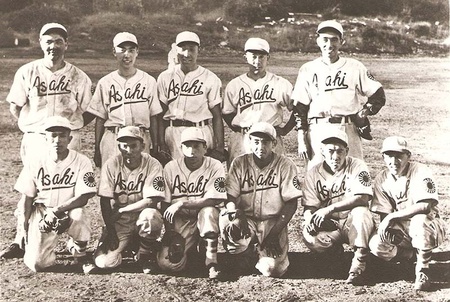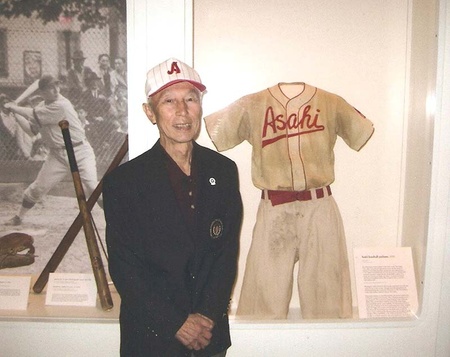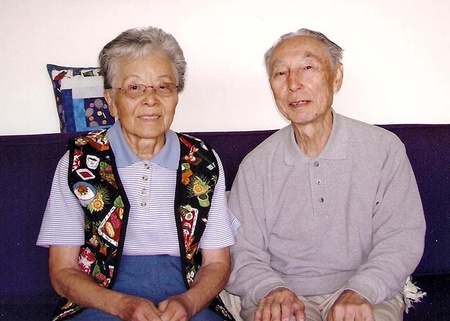For 27 years before World War II, the legendary baseball team “Vancouver Asahi” excited the West Coast of Canada and gave courage and pride to the Japanese community, which suffered from racial discrimination. Former player Koichi Kei Uenishi, 88, is living a healthy life in Kamloops. He plays badminton twice a week, and last year he won a silver medal in the 80-year-old category at the BC Provincial Championships, making him as active as any current player.
Japanese baseball team “Asahi Gun”
In the early 1900s, Japanese pioneers lived in their own communities, enduring racial discrimination and harsh low-wage labor. “Even if you can't speak English, you can play baseball,'' Matsujiro Miyazaki (the first manager) selected nine second-generation Japanese-American boys around the age of 15 and began intensive training. In 1914 (Taisho 3), the Japanese American amateur baseball team “Vancouver Asahi” was born.
The coach told the players, “Don't forget the Yamato spirit and Bushido spirit,'' and forbade his players to make any rough plays or protest against the referees. The boys improved their skills and advanced to the Vancouver Senior League in 1918. They defeated powerful teams on the west coast of Canada one after another. In 1921, the team went on a tour to Japan and played against Wakayama Junior High School, the champions of the summer Koshien tournament (then the national junior high school baseball tournament). In 1926, they became the first Asian-Canadian team to win the Terminal League. At that time, the success of the Vancouver Asahi not only brought great pride to Japanese Americans, but also won the hearts of many fans with their fair play and unique baseball style.

Vancouver Asahi in 1939. Mr. Uenishi is second from the left in the back row (Photo provided by: Mr. Kei Uenishi)
My dream baseball team
Kei Uenishi was born in Vancouver in 1922 and grew up in Hiroshima, her parents' hometown, to receive a Japanese education. When he was 11 years old, he returned to Japan after his father's death. He lived on Powell Street with his mother, who ran an inn, and attended the Vancouver Japanese Language School. Japantown had restaurants, inns, and public baths. Mr. Uenishi is a second-generation Japanese American who lived in that very Japanese American neighborhood and has valuable experience.
In 1935, the year before Japan's first professional baseball league began, the Vancouver Asahi played against the Big Japan Tokyo Baseball Club (Giants), who had traveled from Japan. Before the war, the Japanese newspaper “Taichin Nippo'' published the Vancouver Asahi's battle results every week and was the center of attention. Uenishi started playing baseball, as many young boys did, with an admiration for the Vancouver Asahi. After playing in the Buddhist youth league and Japanese league, he was 17 years old when he was recognized by the Asahi All-Star team and decided to join. “I was so happy that I couldn't sleep,'' she says. He played as an infielder for two years starting in 1939.
Forced to disband due to war
In 1941, while visiting relatives in Japan with his mother, Uenishi was sightseeing in Miyajima when he saw dozens of gray-painted cargo ships anchored offshore. "It was a strange sight. We knew that war would soon begin.” Worried that if she remained in Japan, she would be taken by soldiers, her mother prepared to return to Vancouver. However, after waiting for no flight, I finally boarded the Hikawa Maru, which was due to depart in October, with Mr. and Mrs. Den Sato from the Vancouver Japanese Language School. This was the last ship to call in Canada.
In December 1941, just after the Vancouver Asahi won their fifth straight Pacific Northwest League title, the Japanese army attacked Pearl Harbor in Hawaii. The Canadian government initiated a policy of exclusion of Japanese Americans, and the members, who were scattered across British Columbia's interior, never wore the uniform again.

In 2005, he donated uniforms for the Asahi Military Heritage Exhibition at the Japanese Canadian Museum. Mr. Uenishi wearing the jacket he received from the Canadian Baseball Hall of Fame (Photo provided by: Mr. Kei Uenishi)
Softball in the containment area
The Uenishi family, who applied for free movement, lived in the Japanese-American internment area of East Lillooet, which is further east from Lillooet, 130 kilometers northeast of Whistler. More than 300 people of Japanese descent lived in about 70 shacks. Living without water or electricity. In winter, when temperatures range from minus 20 to 30 degrees Celsius, ice would form inside the house, giving it the nickname “Ice House.” I could hear the sound of frozen tree branches exploding outside. He fetched buckets of water from the Fraser River, poured sand and charcoal into a large barrel inside his house, strained the murky water, and drank it. “The first two years were very difficult,” he says.
Eventually, everyone started working as farmers and the tomatoes grew well. While working at a nearby cannery for 25 cents an hour, she formed a softball team with the help of young people around her. Issei was not allowed to go out into town from the Japanese-American detention area, and a police officer came to check on Issei every month, but this officer happened to like softball, so he started playing games with the town's team. “Softball was the trigger that caused the wall to crack. Thanks to the police officer's arrangement, I was able to go to town.”
After the war, in 1947, he moved to Kamloops to play baseball. I joined the Catholic youth team. I was 25 years old.
Thanks to sports
He married Florence Naoko, also a second-generation Japanese American, who lived in the Okanagan, and they had a son and a daughter. He ran a motel and a state-run liquor store before retiring, but during this time he started playing badminton. "In sports, there is no exclusion and the rules are the same. Thanks to this, I have made more friends and was able to get a good job.”
He currently plays badminton twice a week, and last year won a silver medal in the doubles category for the over-80s at the BC Provincial Championships. He has won dozens of medals so far.
He has served as president of the Centenary Club, a Japanese senior group in Kamloops, and enjoys playing carpet bowling once a week at the Japanese American Hall. In addition to his service at the Buddhist church, he has been a member of the Aberdeen Lions Club for 55 years, keeping him busy.
Documentary broadcast
In 1992, “Asahi, A Legend in Baseball” (written by Pat Adachi) was published, and the Vancouver Asahi was once again in the spotlight. He was inducted into the Canadian Baseball Hall of Fame in 2003 and the British Columbia Sports Hall of Fame in 2005.
In March of this year, Fuji Television aired a documentary program about the Vancouver Asahi. Mr. Uenishi appeared on the program after traveling with a filming crew for four days from Powell Street to East Lillooette and Salmon Arm. Mr. Dowling, a police officer who became a close friend during his time in the detention area, lived in Salmon Arm after retiring and enjoyed fishing. They placed flowers by the lake where he was sleeping and prayed for his repose.
“The only people left in the Vancouver Asahi are Mickey Maekawa from Toronto, Jim Fukui from Delta, and me. Mr. Maekawa is about 98 years old, and Mr. Fukui is about 94 years old. I’m the youngest,” he says with a laugh.
The existence of the Vancouver Asahi was not well known in Japan, but in 2008, Ted Y. Furumoto, whose father was the famous pitcher Teddy Furumoto, published a book called “Vancouver Asahi” that chronicled their activities along with the history of Japanese Americans. It has been published and is attracting attention. Before the war, his senior pitcher, a second-hand pitcher who returned to Japan, was a hero to Uenishi. Mr. Uenishi, who has read this book many times with tears in his eyes, is looking forward to having his children, grandchildren, and many other people read it when the English translation is published.

Asahi Gun alumni Koichi Kei Uenishi (88) and his wife Naoko Florence (86) (Photo provided by Kei Uenishi)
*This article is reprinted from the Vancouver Shimpo (March 25, 2010, issue 13).
© 2010 Vancouver Shinpo


